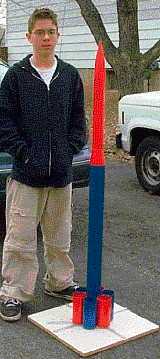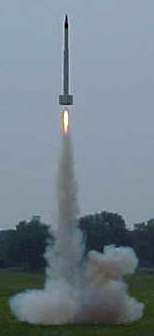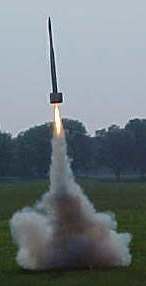| Manufacturer: | LOC/Precision  |

(by Mike Walsh, JR. - 04/01/02)
 Brief:
Brief:
Tube Rocket, with transition
Construction:
I received the package, and the kit was well packaged. It included 2 main body
tubes, a 3.1”x 34” long tube, and a 2.14” x 12” body tube,
as well as nose cone, transition, motor mount parts. It also comes with (6)
3.1” Tube couplers, which are used for the fins. They are pretty durable.
As well as (2) ½” diameter launch lugs. The only common thing is the
assembly of the Motor mount, and the shock cord anchor system. I did not
receive any instructions, but I had some idea as to how to build it. I
constructed the entire motor mount assembly using 5-minute epoxy. I requested a
29mm motor mount, which is what he sent me.
I didn't get any instructions for this kit, as it was a Beta test. But I had an idea of how to build it. I looked at the basic parts. I got a vision of how to build it in my head, then I got to work. It is relatively easy for the intermediate flyer to build. The tube couplers are butted against each other, as well as the airframe. Once you get the first coupler on, the rest of them are simply butted into place. I used spring clamps to help clamp the portions together, so that I could ensure a good bond between couplers. The only mod I made, was to scuff some glassine off of the contact points, to help the epoxy adhere better. I used basic 5 and 15 minute epoxy. Everything went together without a hitch. I cant really give any con's about this kit.
Finishing:
Pros: It is rather easy to come up with exotic ideas for paint schemes, for
instance, like I did on my rocket, you can paint every other tube coupler (fin)
an alternating color, to give it an "exotic" touch. I used Rustoleum
Primer and paint. Cons: If you want to paint the inside of the couplers, it
will be extra work for you.
Construction Rating: 4 out of 5
 Flight:
Flight:
First flight was in March of 2001. I used a G64-4w, and I upped the ejection
charge a little, since it was a larger diameter. I used a simple screw and a
washer for retention. After passing it through RSO, and putting it on the pad,
it was time to witness the moment of truth. It lit instantly, and whistled off
the pad. The ejection charge went off just as the rocket hit apogee, and the
36" parachute opened beautifully. It drifted a little ways, but was
recovered. Upon recovering it, it was found that one of the tube couplers had
"caved" in. The simplest and quickest remedy was to "pop"
it back out.
 Next up, I loaded her up with a G125-5t. A
pass through RSO and she was on the pad within 5 minutes. After the usual
countdown, the motor lit, and it practically exploded off the pad, and up to
about 750 feet. The chute deployed, and it had a flawless recovery. No problems
with the tubes this time.
Next up, I loaded her up with a G125-5t. A
pass through RSO and she was on the pad within 5 minutes. After the usual
countdown, the motor lit, and it practically exploded off the pad, and up to
about 750 feet. The chute deployed, and it had a flawless recovery. No problems
with the tubes this time.
I teamed up with a friend of mine, and we loaded up an H128-M for it. After a few problems with igniters, she took to the air, to about 1200 feet. The chute deployed right on cue, and I had to walk a little further, but it was an impressive flight, nonetheless.
I flew the rocket again about a year later, on a G64, and then an H128. Both flights were flawless.
Flight Rating: 4 out of 5
Summary:
I'd suggest this kit for the intermediate flyer, as it requires a little
patience to build, but if built right, it will reward you with some good
flights. This kit always gets attention at our launches. It's waiting for an
Aerotech I200 :)
Overall Rating: 4 out of 5
Other Reviews
- LOC/Precision Cyclotron By John Lee (November 14, 2009)
Brief: Tube Finned, 38mm Motor Mount, Parachute recovery The LOC Cyclotron looked to be a fairly simple HPR build suitable for somebody with not too much HPR experience. It was a kit I had around for a while but did not get around to building because of few opportunities to launch anything in the HPR range.With some prospects for flight opening up, I dug out this kit and got to ...
- LOC/Precision Cyclotron By Joe Balsamo
( Contributed - by Joe Balsamo - 01/01/02) Brief: Single stage, tube-finned, 38mm rocket with a 3" BT transitioning to a 2.14" payload bay. The rocket is very suitable for Level 1 certifications. Construction: 3" LOC main body tube with 6 coupler tubes used for the tube fins. 38mm LOC Motor mount tube is held in place by two centering rings. The kit comes with ...
 |
 |
Flights
 |
 |
Sponsored Ads
 |
 |












J.b.b.j. (March 29, 2007)